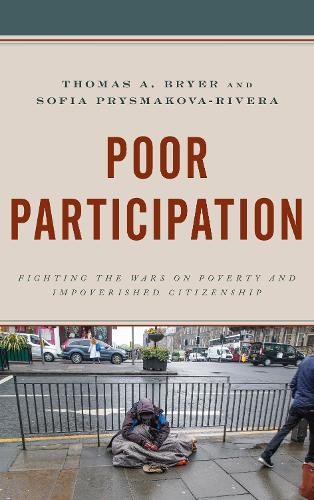
Poor Participation: Fighting the Wars on Poverty and Impoverished Citizenship
(Paperback)
Available Formats
Publishing Details
Poor Participation: Fighting the Wars on Poverty and Impoverished Citizenship
By (Author) Thomas A. Bryer
By (author) Sofia Prysmakova-Rivera
Bloomsbury Publishing PLC
Lexington Books
28th October 2019
United States
Classifications
Professional and Scholarly
Non Fiction
Central / national / federal government policies
Society and culture: general
Migration, immigration and emigration
Poverty and precarity
Housing and homelessness
362.55610973
Physical Properties
Paperback
186
Width 151mm, Height 222mm, Spine 14mm
281g
Description
This book argues that active citizenship and poverty are inextricably linked. A common sentiment in discussions of poverty and social policy is that decisions made about those living in poverty or near-poverty are illegitimate, inadvisable, and non-responsive to the needs and interests of the poor if the poor themselves are not involved in the decision-making process. Inside this intuitively appealing idea, however, are a range of potential contradictions and conflicts. These conflicts are at the nexus between active citizenship and technical expertise, between promotion of stability in governance and empowerment of people, between empowerment that is genuine and sustainable and empowerment that is artificial, and between a war on poverty that is built on the ideas of collaborative governance and one that is built on an assumption of rule of the elite. The poor have long been consigned to a group of included-out citizens. They are legally living in a place, but they are not afforded the same courtesies, entrusted with the same responsibilities, or respected in parallel processes as those citizens of greater means and those who behave in manners that are more consistent with middle class values. Poor citizens engaged in the war on poverty of the 1960s started to emerge and force their agenda through adversarial action and social protest. This book explores the clear linkages between engaged citizenship and poverty in the United States, revealing a war on poverty and impoverished citizenship that continues to develop in the twenty-first century.
Reviews
This is a delightful book that addresses a very complex subject and offers a well-informed and analytic treatment. The work covers a lot of ground and does so with an easy flow of writing and clarity of thinking. The work makes a unique contribution in outlining the complex and nuanced nature of the poor, how this subject has been addressed, and what options are fruitful to explore in the coming decades. The work is well-informed and draws on reasoned interpretation and sound connection to the literature. This is not easily accomplished, but the authors have achieved this with a respect for the literature. -- Jack Meek, University of La Verne
Poor Participation is a powerful call to action grounded in a clear-eyed analysis of what poverty means and does. Looking beyond the conventional focus on financial indigence, Bryer and Prysmakova-Rivera clarify the fundamental roots of poverty in societal power structures and relations of citizenship. Their arguments deserve to be widely considered and debated. -- Joe Soss, Cowles Professor for the Study of Public Service, University of Minnesota
Bryer and Prysmakova-Rivera have written an impressively accessible and engaging volume that highlights the complexities surrounding participation in society by the poor. Drawing on a wide range of evocative data, from illustrative case studies to song lyrics and literary examples that span the globe, it investigates available participatory strategies and solutions to the war on poverty. -- Victoria Foster, Edge Hill University
Author Bio
Thomas A. Bryer is professor in the School of Public Administration and coordinator of the Doctoral Program in Public AffairsPublic Administration Track within the College of Health and Public Affairs at the University of Central Florida. Sofia Prysmakova-Rivera is a PhD student studying public affairs within the College of Health and Public Affairs at the University of Central Florida.
